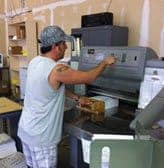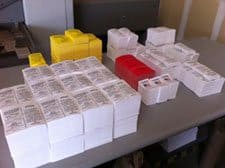After rescuing American Law Label from near collapse and shepherding the company for 23 years, Rocco Bruno Jr., owner and president, is positioning the enterprise for expansion. The growth will be propelled, he says, by a new array of services offered by sister firm Global Registration Services, which Bruno also owns.
The two companies, based in Tucson, Ariz., have roots in a Chicago commercial printing operation founded by Bruno’s grandparents in 1963. In 1985, his father, Rocco Bruno Sr., who then ran the company, was approached by a friend with the idea of printing law labels.
The labels, required by 31 states and the District of Columbia, are used to identify the type of filling materials used in manufactured products. While the labels are most commonly found on upholstered furniture and bedding products, some states require that they be attached to products such as marine and fitness cushions, stuffed toys and cushioned baby equipment. Fifteen states also require manufacturers to be registered or licensed.
“American Law Label was founded on a fluke. And by 1988, when I joined the company, the idea was all but abandoned,” Bruno says.

Two companies under one roof: Though they have their roots in Chicago, American Law Label and Global Registration Services are now run out of a facility in Tucson, Ariz.
Going west, going ‘green’
Bruno set out to revive the law label business his family briefly dabbled in. Working as the company’s sole employee for four years, Bruno quadrupled American Law Label’s annual sales. By 2008, when the company relocated to a 10,000–square–foot facility in Tucson, sales from printing law labels accounted for 90% of the company’s revenue.
Bruno used the move west to “green up” production. By digitizing the operation, he was able to shift away from traditional printing presses and toward a more efficient and environmentally friendly plant.
“By not using conventional printing presses, we’ve eliminated the need for prepress equipment and chemicals,” he says. “We use only recycled papers and have no hazardous waste and no disposal costs.”
Revamping the production process also allowed Bruno to cut costs. That and the fact that it is less expensive to do business in Arizona than in Chicago, helped American Law Label ride out the recent recession.
“From 2008 through much of 2010, we saw a decrease in our sales, but overall profitability wasn’t hurt because of the move and the change in our technology,” he says. “The last quarter of 2010 showed positive signs that sales are heading back upward and we’re anticipating 2011 to bring us back to pre–economic decline levels and perhaps our best year ever.”
Some of this anticipated growth would come from American Law Label’s expansion into foreign markets. Bruno has a team in China evaluating opportunities for his company to provide law labels and other services to the Asian market.
“We already provide services to overseas clients through Global Registration Services,” he says. “The clients don’t necessarily purchase law labels from us, however. If our research shows it to be viable, we can be operating somewhere in China by the end of 2011.”
Another unmet need
Like American Law Label, Global Registration Services came about almost by chance when a law label customer turned to Bruno for help in navigating the complexities of registering his products in various states. Recognizing that he had stumbled upon a need in the bedding and furniture industries, Bruno founded Global Registration Services in 2003 and has been steadily expanding its reach.
Because there are no federally mandated tagging or registration requirements for new mattresses, state governments have passed their own laws and established their own penalties for noncompliance. The state agencies responsible for overseeing law labels and product registration vary, as do the forms states require manufacturers to complete. Many manufacturers, particularly those based overseas, find the process frustrating and time consuming.
“Registration is the most often overlooked detail and the last detail attended to by overseas manufacturers,” Bruno says. “While American Law Label’s client base is mostly domestic, Global Registration Services’ comes entirely from overseas factories. They don’t know anything about these regulations and often can’t pay in U.S. funds. For $1,500, we can complete the forms, obtain registration numbers and print the required law label samples for them, often within a day.”
Bruno takes great satisfaction from the fact that in eight years, Global Registration Services has registered close to 1,000 factories in China, India and Pakistan.
“It’s very gratifying to know that we’ve made another step toward compliance,” he says.
Passionate about compliance
To Bruno, looking for ways to expand tagging and registration compliance is about much more than growing his business. He genuinely believes that compliance is a consumer health and safety issue and works hard to raise awareness about its importance in the bedding and furniture industries. He’s involved in both the International Sleep Products Association and the International Association of Bedding and Furniture Law Officials.
Bruno believes that tagging and registration requirements should be controlled and enforced in a uniform manner by the federal government rather than being left to the discretion of the states.
“The federal government absolutely needs to be involved,” he says. “Some state lawmakers really don’t understand the health issues associated with poorly controlling filling materials. Often state programs are at the bottom of the barrel in terms of funding and many are barely alive.”
Bruno also thinks the fraudulent sale of used mattresses as new and improperly labeled new products is a much larger problem than commonly recognized.
New offerings
In March, Bruno rolled out four new services through Global Registration Services that he hopes will advance compliance by bedding and furniture manufacturers worldwide. These services are integrated into a new website, www.globalrsinc.com, that also launched in March.
The online Registration Center helps manufacturers, importers and retailers understand the intricacies of tagging and registration requirements. It explains the Uniform Registry System, what Uniform Registry Numbers convey and how they are used, and penalties for noncompliance. Armed with information, companies can then tackle the registration process themselves or ask Global Registration Services for assistance.
The company’s new License Management service allows manufacturers to designate the company as its agent for annual license renewals. Vendor Watch takes the concept of license management a step further by protecting retailers from the consequences of offering improperly tagged products for sale.
“States with tagging laws have inspectors go through stores to check for law labels and to run registration numbers to make sure that the registration is valid,” Bruno says. “If there are any discrepancies, the product is pulled from the shelf and fines, which go to the stores, are issued.”
With Vendor Watch, stores can reduce or eliminate this problem by accessing Global Registration Services’ real–time database to check the status of their vendors’ licenses. Although the company doesn’t charge retailers for this service, it does require them to direct their suppliers to sign up for its Certified Vendor program, for which the company does charge an annual fee.
“Vendor Watch is very exciting because it allows us to move from working with one manufacturer at a time to hundreds,” Bruno says. “It provides new momentum for compliance in all areas of the bedding and furniture industries to come together.”
Future growth
Bruno expects the new products to drive Global Registration Services’ annual sales from under $500,000 to between $3 million and $5 million in two years and between $6 million and $8 million in four years.
When he looks 10 years ahead, Bruno sees Global Registration Services and American Law Label as important players in the furniture and bedding industries.
“We really want to make a difference,” he says. “We want to become a company that changes these industries through education and the reduction of noncompliance.”






